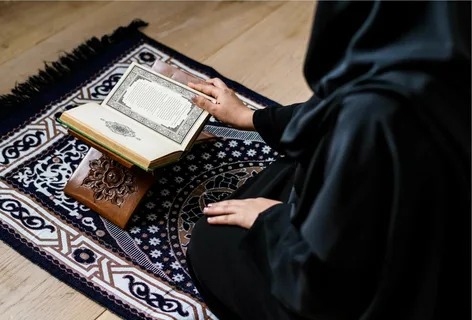Becoming a Muslim convert is a profound and life-altering experience. It involves a spiritual transformation that brings one closer to Allah and embraces a new way of life. While this journey can be incredibly rewarding, it can also be overwhelming for those new to Islam. In this article on Arabian Tongue website, we will explore the essential things every new Muslim convert should know to make their transition smoother and more fulfilling.
What things every new Muslim convert should know?

The Islamic religion includes many teachings and concepts that every Muslim must do and fulfill. These things are the following:
- Embrace the Shahada The Declaration of Faith: The Shahada is the fundamental declaration of faith for Muslims. It consists of two parts: “La ilaha illallah, Muhammadur rasulullah,” which translates to “There is no god but Allah, and Muhammad is the Messenger of Allah.” Embracing the Shahada is the first step in your journey as a Muslim.
- Study the Quran: The Quran is the holy book of Islam, believed to be the word of Allah as revealed to the Prophet Muhammad. Reading and understanding the Quran is crucial for spiritual growth.
- Seek Knowledge: Islam encourages seeking knowledge. Educate yourself about the faith by reading books, attending classes, and seeking guidance from knowledgeable individuals.
- Connect with the Muslim Community: Being part of a supportive community can make your journey as a new Muslim convert more enriching.
- Visit the Mosque: The mosque is the heart of the Muslim community. Visit your local mosque to connect with fellow Muslims and participate in congregational prayers.
- Find a Mentor: Having a mentor or a trusted advisor can provide invaluable guidance and support as you navigate your new faith.
- Practice Patience and Perseverance: Becoming a Muslim convert is a significant change. It’s essential to be patient with yourself and understand that the journey may have its challenges.
- Overcoming Challenges: You may face misunderstandings or discrimination. Stay strong in your faith and seek support from the Muslim community.
- Perform Wudu: Before each prayer, perform ablution (wudu) to purify yourself.
- Embrace the Islamic Lifestyle: Living as a Muslim involves adopting a specific way of life.
- Dietary Restrictions: Learn about halal food and dietary restrictions. Avoid consuming alcohol and pork, and ensure that the food you eat is prepared according to Islamic guidelines.
- Modesty and Dress Code: Muslims are expected to dress modestly. For women, this often includes wearing the hijab or headscarf.
- Maintain a Strong Prayer Routine: Prayer is a central aspect of Muslim life. Establishing a regular prayer routine is essential.
- Continue Learning: Your journey as a Muslim convert is ongoing. Keep seeking knowledge and spiritual growth.
- Attend Islamic Classes: Many mosques and Islamic centers offer classes on various aspects of Islam. Attend these to deepen your understanding.
Understand the Five Pillars of Islam
The Five Pillars of Islam are the foundation of Muslim life. They include:
- Shahada: As mentioned earlier, this is the declaration of faith.
- Salah: Muslims are required to pray five times a day facing the Kaaba in Mecca.
- Zakat: Giving to charity is an important obligation.
- Sawm: Fasting during the holy month of Ramadan.
- Hajj: Pilgrimage to Mecca, mandatory once in a lifetime for those who are able.
Why are People Converting to Islam?

In an increasingly diverse and interconnected world, people are drawn to different religions and belief systems for a multitude of reasons. One religion that has witnessed a steady increase in converts over the years is Islam. The question that arises is, “Why are people converting to Islam?” This is what we will clarify in the following points:
Understanding the Appeal of Islam
Islam, as one of the world’s major religions, offers a unique spiritual and moral framework that resonates with many individuals. Its emphasis on monotheism, community, and social justice can be profoundly appealing to those seeking a sense of purpose and belonging.
The Role of Personal Relationships
For many converts, personal relationships play a pivotal role in their decision to embrace Islam. Friends, colleagues, or romantic partners who are Muslims may introduce them to the religion, sparking their curiosity and interest.
Influence of Global Events
Global events, such as political developments and crises in predominantly Muslim countries, can pique the interest of individuals who want to better understand the religion’s role in the world. Some may convert as a way to show solidarity or foster interfaith dialogue.
Seeking Spiritual Fulfillment
Individuals on a spiritual quest often explore various faiths before finding one that resonates with their beliefs. The spiritual depth and rituals of Islam can offer a profound sense of fulfillment for those seeking a deeper connection with the divine.
Misconceptions and Clarifications
One barrier to conversion is often misconceptions about Islam. Addressing these misconceptions and offering a clearer understanding of the religion’s tenets can open the door to conversion for many.
The Convert Experience
Converting to Islam is a significant life-changing event. Exploring the experiences of converts can provide insights into their motivations, struggles, and personal transformations.
Community and Support
Converts often require a supportive community to navigate their new faith. Mosques and Islamic centers can offer guidance, friendship, and a sense of belonging.
Education and Awareness
Education and awareness initiatives about Islam can help demystify the religion and make it more accessible to those interested in converting.
Women in Islam

The role of women in Islam is a topic of interest for many potential converts. Understanding the rights and responsibilities of women in Islam is essential for those considering conversion, know that wear a hijab when reading Quran.
Conversion Stories
Hearing the stories of individuals who have converted to Islam can be inspiring and enlightening. These stories often highlight the diverse paths that lead to conversion.
Challenges Faced by Converts
It’s essential to address the challenges that converts may encounter, including cultural adjustments, familial reactions, and misconceptions from others.
Social Acceptance
How society perceives and accepts converts can influence their decision to embrace Islam. Promoting acceptance and tolerance is vital in fostering a diverse and inclusive society.
The Future of Conversion Trends
As the world continues to change, the reasons people convert to Islam may evolve. Understanding these trends can provide insights into the future of religious diversity.
Learn Now: Quran Recitation online Course For Kids.
FAQs
Is it mandatory to wear the hijab as a Muslim woman?
No, wearing the hijab is a personal choice for Muslim women. While it is encouraged, it is not mandatory.
How do I find a local mosque to visit?
You can use online directories or ask fellow Muslims in your area for recommendations.
What is the significance of Ramadan fasting?
Ramadan fasting is a way to purify the soul, seek forgiveness, and gain empathy for those less fortunate.
Can converts participate in Hajj?
Yes, converts are eligible to perform Hajj, just like born Muslims, if they meet the necessary criteria.
What is the importance of seeking knowledge in Islam?
Seeking knowledge is highly encouraged in Islam as it leads to a deeper understanding of the faith and helps in personal growth.
Conclusion
Becoming a Muslim convert is a transformative experience that requires dedication, patience, and a thirst for knowledge. Embracing the faith, connecting with the community, and maintaining a strong prayer routine are key to a fulfilling journey in Islam.


